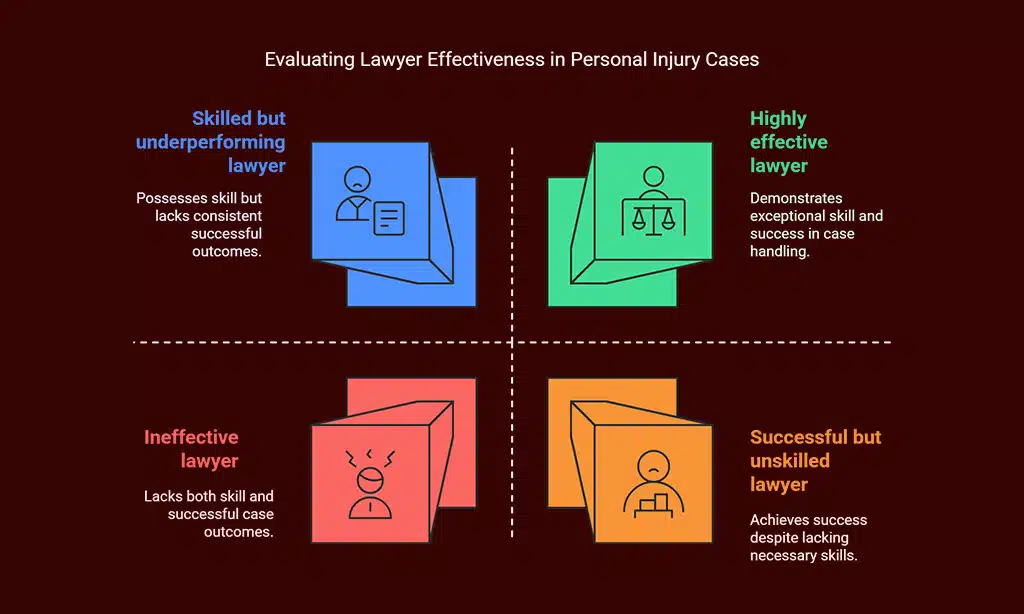Personal injury claims are often long, stressful, and complicated processes, and the lawyer you choose can make or break the outcome of your case. Ideally, your lawyer should be your partner, providing you with expertise, guidance, and proactive steps throughout the entire process. However, it’s not always smooth sailing—sometimes the relationship between you and your lawyer doesn’t live up to expectations.
If you’re currently dealing with an injury claim in Australia and suspect that your lawyer isn’t delivering the results or support you need, it might be time to reevaluate your choice. In this article, we’ll take an in-depth look at the 7 signs you need to switch your personal injury lawyer and offer actionable advice to help you make an informed decision.
Understanding when to switch is crucial in ensuring that your case progresses with minimal complications and that your future remains in capable hands.
Sign 1: Lack of Communication
When you’re involved in a personal injury case, communication is crucial to keep you informed about how your case is progressing. A good personal injury lawyer should communicate regularly and keep you updated on critical developments. From informing you about court dates to explaining legal terms or providing updates on negotiations, timely and clear communication ensures you’re not left in the dark during the proceedings.
Communication breakdowns can lead to missed opportunities, extended case timelines, and even critical errors in handling your case. This is especially problematic in personal injury claims, which often involve strict deadlines that require quick action and coordination.
How to Recognize Poor Communication with Your Lawyer
Signs of poor communication with your lawyer include:
- Difficulty reaching your lawyer: Calls, emails, or messages go unanswered for extended periods.
- Failure to provide timely updates: Not being informed about critical milestones or changes in your case status.
- Confusion over the next steps: If your lawyer is unclear about the direction of your case or provides vague responses.
Tips for Improving Communication with Your Lawyer
If you are experiencing communication issues, you should:
- Set clear expectations: Have a candid discussion with your lawyer about the level of communication you expect. Establish clear deadlines for responses to calls or emails.
- Request regular updates: Ask for scheduled check-ins, even if there’s no significant development. This will help you stay in the loop.
- Use written communication: If verbal communication is unreliable, consider switching to email or formal letters to ensure you have documentation.
When to Seek a New Lawyer Due to Communication Issues
If communication problems persist despite your attempts to resolve them, it’s time to consider switching lawyers. Poor communication can severely affect the outcome of your case, and you need a lawyer who is dedicated to keeping you informed and engaged throughout the process.
| Signs of Poor Communication | Impact on Your Case |
| Unanswered emails or phone calls | Missed deadlines or lost opportunities |
| No updates on your case status | Lack of understanding of your case’s progress |
| Vague or unclear explanations | Increased stress and uncertainty |
Sign 2: Poor Track Record of Success
A lawyer’s track record is one of the strongest indicators of their ability to represent you effectively. Personal injury cases can be complex, requiring extensive knowledge of laws, negotiation tactics, and courtroom strategies. A lawyer with a proven history of success in similar cases will be better equipped to handle the nuances of your claim and navigate potential pitfalls.
How a Lawyer’s Success Rate Affects Your Case
A strong success rate doesn’t just mean securing high settlements; it also indicates a lawyer’s skill in handling different aspects of a personal injury case, such as mediation, negotiations with insurance companies, or litigation in court. If your lawyer struggles to produce favorable outcomes, it may signal a lack of expertise, which could jeopardize your claim.
Red Flags to Watch for in a Lawyer’s Performance History
- Lack of significant results: If your lawyer has little to show in terms of successful cases or settlements, this is a clear warning sign.
- Unclear case outcomes: Be wary if your lawyer is vague about their past successes or doesn’t provide you with concrete examples or case studies.
- Negative reviews or poor reputation: Always check online reviews and ask for references. If multiple clients report dissatisfaction, it’s a red flag.
Case Study Example: The Importance of a Lawyer’s Track Record
Imagine you were involved in a car accident and hired a lawyer who had a mixed record of personal injury settlements, with no cases involving motor vehicle accidents. You’re now facing an insurer who is resistant to a fair settlement. A lawyer with experience handling motor vehicle accident claims would have the expertise to navigate negotiations effectively and avoid a prolonged battle with the insurer.
| Red Flags in Track Record | Potential Risks for Your Case |
| No proven wins in personal injury | Unfamiliarity with the nuances of your case |
| Lack of relevant experience | Increased likelihood of a poor outcome |
| Negative reviews or testimonials | Damage to your case’s credibility |
Sign 3: Unclear or Excessive Fees
Most personal injury lawyers in Australia work on a no win, no fee basis, meaning they don’t get paid unless you win your case. However, it’s important to ensure the fee structure is clearly defined at the outset. You shouldn’t be surprised by hidden costs or additional fees down the track. Any ambiguity about costs can be a sign that your lawyer is less transparent than they should be.
What to Do if Your Lawyer’s Fees Are Unclear or Too High
If you feel the fees are unclear or are not being explained adequately:
- Request a detailed breakdown of all fees: This should include any upfront costs, percentage taken if the case is won, and any other fees (e.g., administrative costs, expert witness fees).
- Compare fees with other lawyers: If you’re unsure, research other personal injury lawyers in your area to get a sense of the average fees for similar cases.
- Clarify all contingencies: Make sure you fully understand how the lawyer’s payment works and if there are any conditions or clauses that could result in unexpected costs.
Transparent Fee Structures vs. Hidden Costs
| Transparent Fee Structures | Hidden Costs |
| Clear contingency fee percentages | Unexplained charges for court filings |
| No upfront fees required | Charges for consultations that weren’t mentioned |
| All costs outlined in writing | Last-minute requests for additional payments |
Sign 4: Lack of Personalized Attention
Personal injury cases are highly individual, and a one-size-fits-all approach rarely works. Every case involves unique circumstances, injuries, and legal challenges. Your lawyer should take the time to understand your specific situation, answer your questions, and customize a legal strategy that fits your needs.
How to Tell if Your Lawyer is Too Busy for Your Case
If your lawyer seems distant, hurried, or inattentive to the details of your case, it might mean they are juggling too many clients. Overburdened lawyers are less likely to give your case the careful attention it needs.
Signs Your Lawyer is Overloaded with Cases
- Delegation to junior staff: You’re not meeting with the lead lawyer, but instead, a paralegal or less experienced lawyer handles your case.
- Lack of focus: Your lawyer doesn’t seem to understand the specifics of your case or is unprepared for meetings.
- Inconsistent communication: Important details about your case aren’t addressed in a timely manner.
Actionable Steps to Take
If you feel that your lawyer isn’t prioritizing your case, have a direct conversation about your concerns. Request clearer communication and more face-to-face interactions. If the situation doesn’t improve, it’s time to consider finding a lawyer who will give your case the individual attention it deserves.
| Signs of Overload | Consequences for Your Case |
| Multiple clients being handled at once | Lack of tailored legal strategy |
| Routine work delegated to paralegals | Delays and missed deadlines |
| Absence during important meetings | Missed opportunities for key decisions |
Sign 5: No Clear Strategy or Plan for Your Case
A personal injury claim requires a well-thought-out plan. The lawyer should explain the next steps and provide a clear timeline for your case. They should be able to outline their strategy for negotiation, potential settlement offers, and how they will approach litigation if the case goes to court.
Red Flags: When Your Lawyer Doesn’t Provide a Clear Path Forward
If your lawyer can’t offer a clear strategy or timeline, it may suggest they are unprepared or inexperienced. You should expect them to articulate their plan and be able to explain what to expect at each stage of the process.
How to Evaluate Your Lawyer’s Case Strategy
When evaluating your lawyer’s plan, consider:
- Understanding of your needs: Do they address your specific concerns and goals for the case?
- Actionable steps: Are they clear about how they’ll move forward with your case, including deadlines, negotiations, and other logistics?
- Realistic expectations: Are they honest about potential challenges or delays?
| Key Strategy Elements | What to Expect |
| Clear case timeline | Deadlines for each phase of your case |
| Plan for negotiations or settlements | A strategy for dealing with opposing parties |
| Contingency for litigation | A plan in case your case goes to trial |
Sign 6: Delays in Filing or Handling Paperwork
In personal injury claims, timely submission of paperwork is critical. Missing deadlines, delaying filings, or failing to provide the required documentation can significantly affect the progression of your case. Every delay not only lengthens the process but may also result in missed legal opportunities, which could undermine your case’s credibility.
A lawyer who fails to meet important deadlines or handle paperwork efficiently can put you in a precarious position, making your claim more vulnerable. The legal system and insurance companies operate on strict timelines, and every delay can result in setbacks.
When Should You Be Concerned About Paperwork Delays?
- Missed filing deadlines: If your lawyer misses important deadlines (e.g., filing court documents or sending evidence to the opposing party), this could jeopardize your claim.
- Unclear paperwork process: If you are left guessing about which documents are needed or when they need to be submitted, it’s a sign your lawyer may not be paying enough attention to the details.
- Failure to keep you updated: If you’re left wondering about the status of your case because paperwork hasn’t been filed or processed on time, it suggests poor case management.
The Risks of Delaying Paperwork
Delays in filing or handling paperwork can result in:
- Loss of critical evidence: In personal injury cases, evidence is crucial. If documents or medical records are not submitted on time, you risk not being able to use them in court.
- Loss of your right to claim: In some instances, delays in submitting paperwork may cause you to miss the statute of limitations, which may bar you from seeking compensation.
- Weakening your case: Delays often send a message to the insurance companies or opposing lawyers that your case is disorganized, which may result in lower settlement offers or unfavorable decisions in court.
How to Address Paperwork Delays
If you suspect delays in your case’s paperwork, here’s what you should do:
- Request a timeline: Ask your lawyer to provide a detailed schedule for all necessary filings and follow-up on progress.
- Check in regularly: Schedule regular updates to ensure documents are being handled in a timely manner.
- Ask for confirmation: Request written confirmation when filings or submissions are made, ensuring you have proof that your lawyer is keeping track of deadlines.
If your lawyer continues to fall short in managing paperwork or regularly causes delays, it may be time to seek new representation to avoid further setbacks.
| Signs of Paperwork Delays | Impact on Your Case |
| Missed filing deadlines | Risk of missing key deadlines and statute of limitations |
| Unclear paperwork process | Confusion and disorganization, potential loss of evidence |
| Lack of updates on submissions | Loss of confidence in your lawyer’s ability to manage your case |
Sign 7: Disrespectful or Unprofessional Behavior
The lawyer-client relationship should be built on respect, trust, and professionalism. If your lawyer displays unprofessional behavior or disrespect, it can lead to additional stress and dissatisfaction. A lawyer who treats you poorly may not fully understand the emotional toll a personal injury can have on your life, which can affect their commitment to your case.
Recognizing Unprofessional Conduct in Your Lawyer
Unprofessional behavior can manifest in many ways, including:
- Rudeness: If your lawyer is dismissive or disrespectful, it may create an uncomfortable environment and could negatively affect your trust in their expertise.
- Unethical practices: Any behavior that seems morally or legally questionable should be treated as a serious concern. This could include over-promising results, bending the truth, or pushing you into a settlement that doesn’t meet your needs.
- Lack of empathy: A personal injury case often involves emotional and physical challenges. A lawyer who shows no empathy or understanding of your situation could harm your case by failing to present your injury and recovery accurately in front of judges or insurance adjusters.
Examples of Disrespectful or Unprofessional Lawyer Behavior
- Aggressive language: A lawyer who uses forceful or overly aggressive tactics in communication with you or others involved in the case may indicate a lack of professionalism.
- Ignoring your concerns: If your lawyer dismisses your questions or concerns, refusing to address your fears or anxieties about the case, they are not providing the compassionate support you deserve.
- Not honoring agreements: A lawyer who fails to keep promises, misses meetings, or doesn’t follow through on commitments is demonstrating an unprofessional attitude.
How to Address Disrespectful or Unprofessional Behavior
If you notice disrespectful or unprofessional behavior, here’s what you should do:
- Speak up: Express your concerns directly to your lawyer. Let them know how their behavior is affecting your trust in their ability to represent you.
- Assess their response: A professional lawyer will be willing to listen and address your concerns. If they dismiss you or respond defensively, it may be time to find new representation.
- Set boundaries: Ensure that any further communication is respectful, and establish clear expectations for how you should be treated.
If your lawyer continues to act disrespectfully or unprofessionally, it may be time to part ways and seek a lawyer who can treat you with the respect and professionalism that you deserve.
| Signs of Disrespectful Behavior | Consequences for Your Case |
| Rudeness or aggressive behavior | Strained lawyer-client relationship, possible stress or anxiety |
| Lack of empathy or understanding | Missed opportunities for emotional connection with the court or jury |
| Ignoring or belittling your concerns | Reduced confidence in your lawyer’s ability to handle your case effectively |
Wrap Up: Making the Right Choice for Your Personal Injury Case
Choosing the right personal injury lawyer in Australia is a pivotal step in ensuring that you receive the compensation and justice you deserve. While switching lawyers can feel daunting, it is sometimes necessary for the well-being of your case. Recognizing the 7 signs you need to switch your personal injury lawyer can help you avoid prolonged frustration and give you the chance to find a more dedicated and experienced legal professional.
Here’s a quick recap of the key signs you should watch out for:
- Lack of Communication – Your lawyer is difficult to reach, and you receive little to no updates.
- Poor Track Record of Success – Your lawyer lacks relevant experience or past successes in personal injury cases.
- Unclear or Excessive Fees – Fees are not transparent or are higher than expected without proper explanation.
- Lack of Personalized Attention – Your lawyer is too busy to give your case the attention it needs.
- No Clear Strategy or Plan for Your Case – Your lawyer can’t articulate a clear path forward for your case.
- Delays in Filing or Handling Paperwork – Missed deadlines or inadequate handling of important documents.
- Disrespectful or Unprofessional Behavior – Your lawyer shows a lack of respect, professionalism, or empathy.
If you identify any of these issues with your current personal injury lawyer, it’s important to reassess your options. Seeking out a new lawyer who communicates effectively, has a strong track record, and treats you with respect can significantly improve the outcome of your case.
You deserve a legal professional who will advocate for your best interests every step of the way. Don’t hesitate to make the switch if necessary—your future and your compensation are worth it.







































